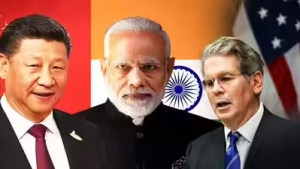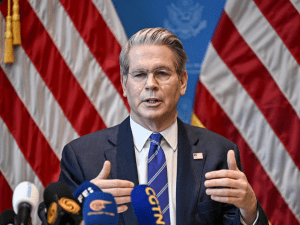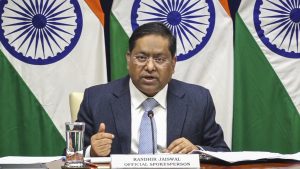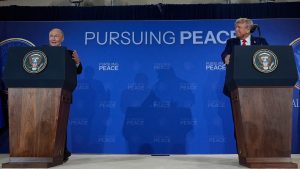Washington D.C. – US Treasury Secretary Scott Bessent has outlined an ambitious strategy to achieve Russian economy collapse tariffs by implementing comprehensive secondary sanctions on countries purchasing Russian oil. Speaking on Sunday, Bessent called for coordinated action between the Trump administration and European Union to intensify economic pressure on Moscow, claiming such measures could force President Vladimir Putin into Ukraine peace negotiations.
“If the US and the (European Union) can come in, do more sanctions, secondary tariffs on the countries that buy Russian oil, the Russian economy will be in full collapse, and that will bring President Putin to the table,” Bessent stated, emphasizing the potential effectiveness of the Russian economy collapse tariffs strategy.
The Treasury Secretary’s proposal represents a significant escalation in economic warfare tactics, targeting not only Russia directly but also its international trading partners through secondary sanctions mechanisms.
India and China Targeted as “Bad Actors”

Bessent specifically accused India and China of being “bad actors” for their continued purchase of Russian oil, alleging that these transactions effectively support Russia’s war effort in Ukraine. The Russian economy collapse tariffs strategy specifically targets these major economies that have maintained energy relationships with Moscow despite Western sanctions.
The Treasury Secretary called for enhanced sanctions and secondary tariffs on all countries conducting trade with Russia, arguing that such measures are essential for implementing the Russian economy collapse tariffs effectively. This approach would significantly expand the scope of economic pressure beyond Russia itself to include its major trading partners.
Current US policy has already imposed steep 50% tariffs on Indian imports due to Russian oil purchases, while China faces a staggering 145% levy that has been temporarily suspended for 90 days, demonstrating early implementation of the Russian economy collapse tariffs concept.
European Coordination Essential for Success


Bessent emphasized that achieving Russian economy collapse tariffs requires coordinated action with European partners, acknowledging that unilateral American action would be insufficient. “We need our European partners to follow us, because if the US and the EU do this together, we are in a race now between how long can the Ukrainian military hold up versus how long can the Russian economy hold up?” he explained.
The Treasury Secretary indicated that the Trump administration was “prepared to increase pressure on Russia” through expanded implementation of Russian economy collapse tariffs, suggesting that current measures represent only the beginning of a broader economic campaign.
This coordinated approach recognizes that the Russian economy collapse tariffs strategy requires multilateral commitment to be effective, particularly given Russia’s diverse global trading relationships.
India’s Response to Western Hypocrisy


India has strongly criticized what it perceives as Western hypocrisy regarding the Russian economy collapse tariffs policy, pointing out that several European countries continue purchasing substantial amounts of Russian energy without facing similar penalties. New Delhi argues that the selective enforcement of sanctions undermines the legitimacy of the Russian economy collapse tariffs approach.
This criticism highlights a fundamental challenge in implementing comprehensive Russian economy collapse tariffs: ensuring consistent application across all Russian energy customers, including traditional Western allies who may have maintained energy relationships with Moscow.
The disparity in treatment between different Russian oil purchasers raises questions about the fairness and effectiveness of the Russian economy collapse tariffs strategy as currently implemented.
Also Read: Modi Skip UN Session: Stunning Decision Amid Trump 50% Tariff War
Trump’s Frustration with Ukraine Conflict
Bessent’s proposal for Russian economy collapse tariffs comes amid growing frustration within the Trump administration over the inability to resolve the Ukraine conflict quickly. Despite earlier pledges that he could end the war rapidly after assuming office for a second term in January, Trump has struggled to achieve meaningful progress toward peace.
The Russian economy collapse tariffs strategy represents an alternative approach to diplomatic engagement, focusing on economic pressure rather than direct negotiations to compel Russian behavior change.
Trump’s frustration has intensified following the inconclusive Alaska summit between himself and Putin, which concluded without any agreement to end or pause the Ukraine war.
Alaska Summit Aftermath and Diplomatic Implications


The high-profile Alaska summit between Trump and Putin failed to produce concrete results despite what Trump characterized as “productive” discussions. While Trump noted that the leaders agreed on many points, he emphasized that “There’s no deal until there’s a deal,” indicating the limitations of diplomatic engagement.
Prime Minister Modi responded to the Trump-Putin meeting by reaffirming India’s consistent support for peaceful resolution of the Ukraine conflict, calling the leadership of both Trump and Putin “highly commendable” in pursuing peace efforts.
The summit’s failure to achieve breakthrough results has reinforced arguments for pursuing the Russian economy collapse tariffs strategy as an alternative approach to conflict resolution.
Escalating Ukraine-Russia Hostilities
The urgency of implementing Russian economy collapse tariffs has been underscored by recent dramatic escalations in the conflict. Russian forces struck government buildings housing Ukraine’s cabinet in central Kyiv, killing at least three people and causing significant damage to critical infrastructure.
In retaliation, Ukraine targeted Russia’s Druzhba oil pipeline in the Bryansk region, escalating the conflict into both government and energy infrastructure domains. These attacks represent some of the most serious escalations in months, highlighting the ongoing intensity of the conflict.
The continued escalation reinforces Bessent’s argument that economic pressure through Russian economy collapse tariffs may be necessary to compel both sides toward meaningful negotiations, particularly given the apparent failure of diplomatic initiatives to achieve sustainable progress toward peace.

